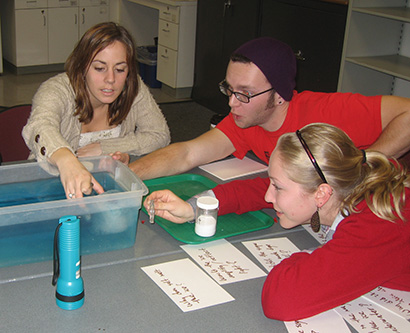Campus News
NSF grant supports training of math and science teachers at UC Santa Cruz
The $1.45 million grant continues NSF support for UCSC’s Cal Teach program, funding an integrated pathway to recruit and train new teachers for the Central Coast region.

UC Santa Cruz has received a $1.45 million grant from the National Science Foundation’s Robert Noyce Teacher Scholarship Program to recruit and prepare new math and science teachers in partnership with regional school districts and community colleges.
This is the third in a series of five-year NSF grants supporting the UC Santa Cruz Cal Teach program and Education Department in their efforts to increase the number and retention of new, highly qualified science and math teachers in high-need California public schools.
“The goal for this project is to strengthen the regional pipeline that supports students who are interested in math and science teaching careers,” said Cal Teach Program Director Gretchen Andreasen.
The Cal Teach program serves UCSC undergraduates in science, mathematics, or engineering majors, as well as prospective transfer students from regional community colleges, who are interested in teaching careers. The program offers a sequence of internship placements in schools during the academic year, as well as summer teaching internships.
Cal Teach workshops and seminars help to support students and prepare them for teaching careers. The program also provides academic and career advising, enrichment opportunities, and financial support for prospective or novice science and math teachers. In addition to serving undergraduates, the program welcomes STEM professionals who want to explore teaching careers.
Much of the funding from the Noyce program grant will go toward scholarships for Cal Teach participants to enter the combined M.A./teaching credential program offered by the UC Santa Cruz Education Department.
“The Noyce Scholarships make a big difference for the credential program in terms of maintaining the size and strength of the math and science cohorts,” Andreasen said.
The NSF grant also funds stipends for interns and their mentors in partner schools and for early-career professional development for graduates of the program. About 30 percent of Cal Teach participants go on to careers in teaching, Andreasen said.
“Cal Teach provided me the opportunity to see myself in multiple classroom settings as I considered a career in education,” said Noyce Scholar Madeleine Swift. “From my internships, I knew I wanted to be an educator.”
UCSC’s community college partners in this project are Hartnell College, Cabrillo College, and San Jose City College. The five school district partners are Gonzales Unified, Salinas Union High School, Pajaro Valley Unified, Santa Cruz City Schools, and East Side Union High School District.
By recruiting participants from regional community colleges, the Cal Teach program aims to support prospective math and science teachers who are likely to remain in the area and teach in the partner school districts. Dozens of the program’s graduates are now teaching at schools in the Monterey Bay, Salinas Valley, and San Jose regions.